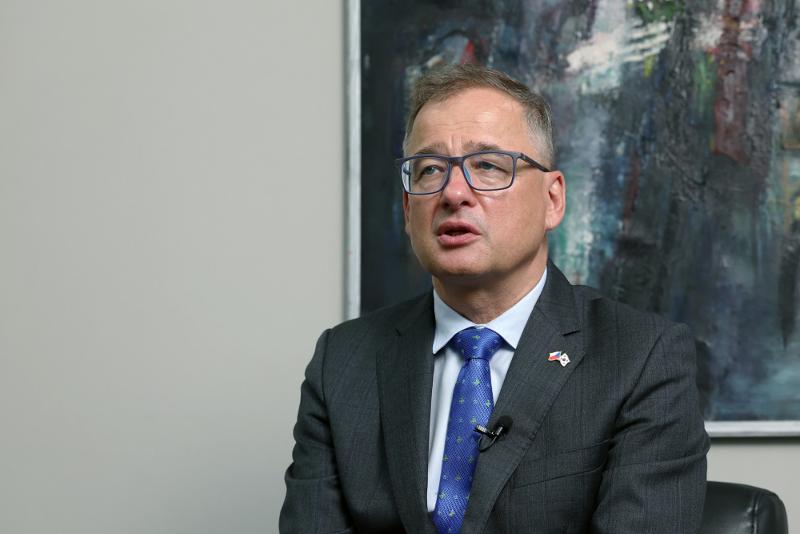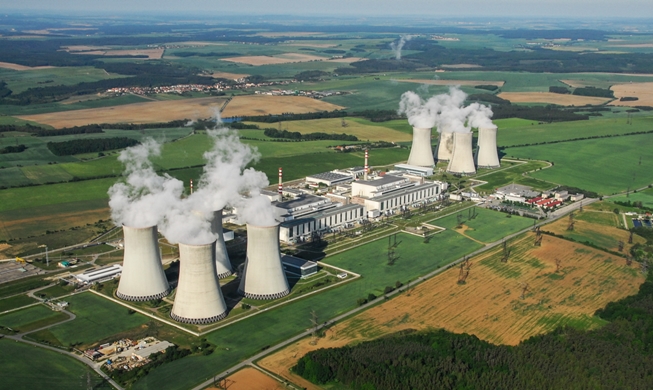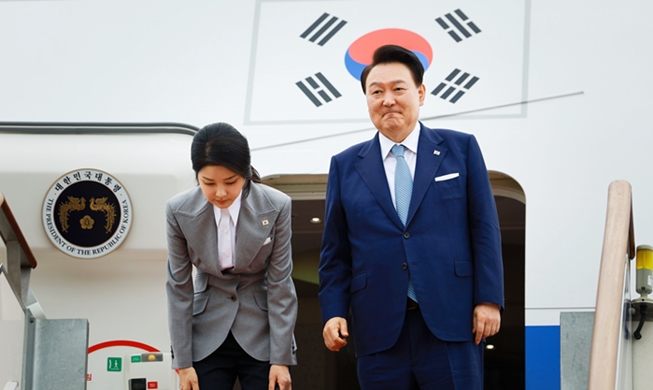
Czech Ambassador to Korea Ivan Jancarek on Sept. 12 at the Czech Embassy in Seoul's Jongno-gu District says the strong trust between the two countries is the basis for a joint project to build nuclear plants in the Eastern European country. (Lee Jun Young)
By Yoon Sojung and Hong Angie with contribution from Kwon Soojin
Video = Lee Jun Young and Park Daejin
"A European hub to supply sustainable energy to other countries in the region."
This is what Czech Ambassador to Korea Ivan Jancarek hopes for in nuclear power cooperation between Korea and the Czech Republic, aka Czechia.
In July, Prague selected Korea Hydro & Nuclear Power as the preferred bidder to build four nuclear reactors in the Dukovany region of the Czech Republic.
"Korea's proposal was the best among the three tenders we received," the ambassador said. "To make such an important decision for cooperation in the nuclear industry, you have to have strong trust in each other."
"There was a conviction on our side that Koreans would be able to fulfill all the conditions when they put it on the table during the offer."
"In fact, both countries are very close to each other," he added. "Having lived in Seoul, I found out that Koreans understand our humor well and we have an emotional bond."
Such a connection between the two people dates back to 1920, when the Korean Independence Army purchased weapons from the Czechoslovak Legion to fight for liberation from Japanese colonial rule, far earlier than 1990, when Seoul and Prague formed official relations.
On the upcoming visit of President Yoon Suk Yeol to the Czech Republic, Ambassador Jancarek said, "I hope this visit will help confirm nuclear power cooperation by both countries and expand cooperation in other sectors," adding, "I'm sure that the people of both countries can find out that we're very close to each other."
The following are excerpts from the Sept. 12 interview with the ambassador at his embassy in Seoul.
What do you consider the biggest result of bilateral cooperation so far?
As a major outcome, I would first mention the two countries' decision to upgrade bilateral ties in 2015 to a strategic partnership. Since forging diplomatic relations in 1990, the two countries have continued to develop ties thanks to the opening of direct flights in 2004, which increased the volume of people-to-people exchange and mutual trust. Thanks to the direct flights, about 400,000 Koreans visit the Czech Republic every year.
President Yoon's from Sept. 19 will pay an official visit to the Czech Republic. What meaning do you think his trip holds?
President Yoon's official visit to the Czech Republic will bring new momentum to bolster bilateral relations. Regarding Prague's decision to choose Korea as its preferred bidder for the nuclear power plant project, the upcoming presidential visit will confirm the deal between both countries, and we will discuss how to reinforce our relations backed by the project.
What joint projects do both sides have and what sectors does Prague wish to expand cooperation in?
The opening of direct flights and market opening in 2004 helped both countries accelerate bilateral cooperation. In 2005, Hyundai Motor opened a factory in Czechia and Nexen Tire followed suit. More than 100 Korean companies are operating on the Czech market. We can also find Czech products on the Korean market like beer.
Nuclear power is a new source of sustainable, environment-friendly energy, which will play a pivotal role in the industrialized economies of both sides. Based on nuclear power cooperation, both countries can build a European hub to supply sustainable energy to other countries in the region or build nuclear power stations in other European nations. Also, both countries can deepen cooperation in many sectors such as high-speed rail, semiconductors, artificial intelligence, quantum science and nanotechnology.
The Czech national security adviser in Seoul early this month expressed confidence in Korea on the nuclear plant project. Why is Prague so actively cooperating with Seoul in this sector?
Among the three tenders we received from companies in France, the U.S. and Korea, Korea's proposal was the best. The screening was carried out in a fair and transparent way and every law was complied with, and we don't have any concerns. I can assure you that this project will not be derailed.
To make such an important decision for cooperation in the nuclear industry, you have to have strong trust in each other. Our conviction was that Koreans would be able to fulfill all the conditions when they put it on the table during the offer. We are sure that we can also lay the foundation for good business in other European countries or other markets in the world.
Bilateral trade has steadily risen from USD 3.6 billion to 2020 to USD 4.4 billion last year. What has fueled such growth despite obstacles like the COVID-19 pandemic?
In my view, I believe COVID-19 was a minor obstacle. The tourism industry was directly hit by it, but not the sectors of trade, goods and services. Bilateral trade is on the increase. Goods produced from production facilities built by Korea in Czechia are being exported overseas, which also accounts for an important part in balancing the exports and trade of our country. I wish for Korean customers to find more Czech products on the Korean market and for the trade balance between both countries to be improved.
How does Prague see Seoul's efforts to secure peace and a nuclear-free Korean Peninsula?
Securing peace on the Korean Peninsula is important for not just for the Czech Republic but also all likeminded countries. We support the Korean government, which makes all efforts for improving peace and the denuclearization of the Korean Peninsula.
We also thank the Korean government for providing humanitarian and reconstruction assistance to Ukraine. More than two years have passed since the war in Ukraine broke out, but more than 350,000 Ukrainians are in the Czech Republic. As we had similar historical experiences like Ukraine, Czechia has a strong sense of duty to help them.
What aspects of Czech culture would you personally like to introduce Koreans to?
I was surprised and thankful over how Koreans love Czech classical musicians like Antonin Dvorak and Leos Janacek. Our cultural center in Seoul has hosted more active exchanges and concerts in this regard. The Prague Spring Festival is also well known in the classical music arena and many Koreans win awards there. In October this year, directors of the festival will visit Korea to pursue more bilateral cooperation in classical music.
Since assuming your post in October last year, what goals do you have while here?
Having lived in Seoul, I found out that Koreans understand our humor well and we have an emotional bond. In fact, both countries are close to each other. I have a lot of goals and plans for bilateral ties, but for now, through the upcoming presidential visit, I wish for both countries to confirm nuclear power cooperation and its snowball effect to expand to other sectors. I'm sure that the people of both countries can find out that we're very close to each other.
arete@korea.kr

